-
 Bitcoin
Bitcoin $94,612.2058
-1.31% -
 Ethereum
Ethereum $1,824.7761
-0.76% -
 Tether USDt
Tether USDt $1.0000
-0.03% -
 XRP
XRP $2.1734
-1.52% -
 BNB
BNB $591.8527
-0.83% -
 Solana
Solana $146.9309
1.08% -
 USDC
USDC $0.9999
-0.03% -
 Dogecoin
Dogecoin $0.1733
-0.98% -
 Cardano
Cardano $0.6847
-1.84% -
 TRON
TRON $0.2489
0.21% -
 Sui
Sui $3.4067
7.04% -
 Chainlink
Chainlink $14.0780
-0.30% -
 UNUS SED LEO
UNUS SED LEO $9.0918
1.21% -
 Avalanche
Avalanche $19.9628
-1.13% -
 Stellar
Stellar $0.2676
-1.26% -
 Shiba Inu
Shiba Inu $0.0...01293
-1.18% -
 Toncoin
Toncoin $3.0281
-2.37% -
 Hedera
Hedera $0.1773
-1.39% -
 Bitcoin Cash
Bitcoin Cash $360.2996
0.10% -
 Hyperliquid
Hyperliquid $20.6210
-0.75% -
 Litecoin
Litecoin $88.0317
1.85% -
 Polkadot
Polkadot $3.9767
-0.81% -
 Dai
Dai $1.0000
-0.03% -
 Bitget Token
Bitget Token $4.3175
-1.02% -
 Monero
Monero $273.7451
-0.03% -
 Ethena USDe
Ethena USDe $1.0003
-0.03% -
 Pi
Pi $0.5919
-0.04% -
 Pepe
Pepe $0.0...08305
1.37% -
 Uniswap
Uniswap $5.0937
0.17% -
 Aptos
Aptos $5.1531
0.12%
What is the difference between APT contract trading and spot trading? Which one is more suitable for ordinary investors?
APT contract trading involves futures with leverage, suitable for experienced investors, while spot trading is simpler and less risky, ideal for ordinary investors.
May 05, 2025 at 09:49 am
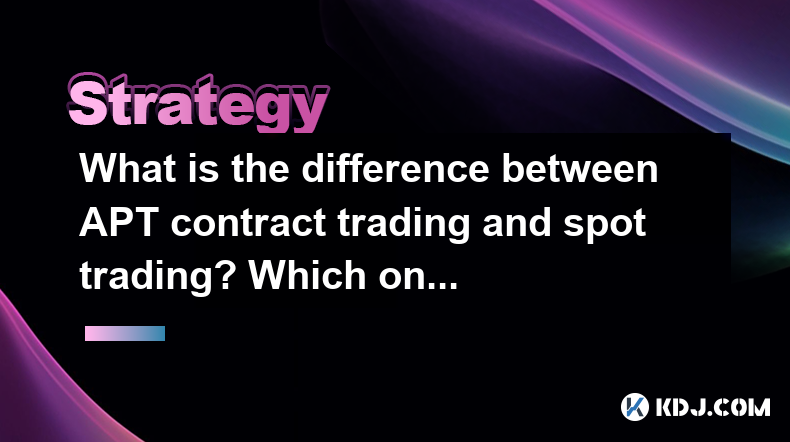
Introduction to APT Contract Trading and Spot Trading
In the world of cryptocurrencies, trading can be conducted in various forms, with APT contract trading and spot trading being two of the most common methods. Understanding the differences between these two types of trading is crucial for investors looking to navigate the crypto market effectively. This article will delve into the specifics of APT contract trading and spot trading, highlighting their key differences and discussing which might be more suitable for ordinary investors.
What is APT Contract Trading?
APT contract trading, also known as futures trading, involves trading contracts that obligate the buyer to purchase, and the seller to sell, a specific amount of an asset at a predetermined price on a specified future date. These contracts are typically used for hedging or speculating on the future price movements of cryptocurrencies.
In APT contract trading, traders do not own the underlying asset. Instead, they trade contracts that derive their value from the underlying asset. This type of trading allows for leverage, meaning traders can control a large position with a relatively small amount of capital. However, this also increases the potential for significant gains or losses.
What is Spot Trading?
Spot trading involves the direct exchange of cryptocurrencies for immediate delivery. When you engage in spot trading, you are buying or selling the actual cryptocurrency at the current market price. This type of trading is straightforward and is often the first type of trading that new investors encounter.
In spot trading, the transaction is settled immediately, and the ownership of the cryptocurrency is transferred to the buyer. This method is less complex than contract trading and does not involve leverage, making it generally less risky.
Key Differences Between APT Contract Trading and Spot Trading
The primary differences between APT contract trading and spot trading lie in their mechanics, risk levels, and potential returns.
Ownership of the Asset: In spot trading, you own the actual cryptocurrency. In contrast, APT contract trading involves trading contracts that derive their value from the underlying asset, without owning the asset itself.
Settlement Time: Spot trading involves immediate settlement, whereas APT contract trading involves a future settlement date.
Leverage: APT contract trading often allows for the use of leverage, which can amplify both gains and losses. Spot trading does not typically involve leverage.
Complexity and Risk: APT contract trading is generally more complex and carries higher risk due to the use of leverage and the speculative nature of futures contracts. Spot trading is simpler and less risky, as it involves direct ownership and immediate settlement.
Which is More Suitable for Ordinary Investors?
For ordinary investors, spot trading is often more suitable due to its simplicity and lower risk profile. Here are some reasons why spot trading might be preferable for the average investor:
Lower Risk: Spot trading does not involve leverage, which means the potential for significant losses is reduced. This makes it a safer option for those new to cryptocurrency trading.
Simplicity: Spot trading is straightforward. You buy or sell the cryptocurrency at the current market price, making it easier to understand and manage.
Immediate Ownership: With spot trading, you immediately own the cryptocurrency, which can be reassuring for investors who prefer to have direct control over their assets.
On the other hand, APT contract trading may be more suitable for experienced investors who are comfortable with higher risk and complexity. These investors might be looking to leverage their positions to potentially achieve higher returns, and they understand the intricacies of futures contracts.
How to Get Started with Spot Trading
If you decide that spot trading is the right choice for you, here are the steps to get started:
Choose a Reliable Exchange: Select a reputable cryptocurrency exchange that supports spot trading. Popular options include Binance, Coinbase, and Kraken.
Create an Account: Sign up for an account on the chosen exchange. You will need to provide personal information and complete a verification process.
Deposit Funds: Fund your account with fiat currency or another cryptocurrency. Most exchanges offer various deposit methods, such as bank transfers or credit card payments.
Select a Cryptocurrency: Choose the cryptocurrency you want to trade. Popular options include Bitcoin (BTC), Ethereum (ETH), and Litecoin (LTC).
Place an Order: Decide whether you want to buy or sell the cryptocurrency. You can place a market order, which executes at the current market price, or a limit order, which executes at a specified price.
Monitor and Manage Your Trades: Keep an eye on your trades and the market. You can set stop-loss orders to limit potential losses or take-profit orders to secure gains.
How to Get Started with APT Contract Trading
If you are an experienced investor interested in APT contract trading, here are the steps to get started:
Choose a Futures Exchange: Select an exchange that offers futures trading. Examples include Binance Futures, Bybit, and FTX.
Create an Account: Sign up for an account on the chosen futures exchange. You will need to provide personal information and complete a verification process.
Deposit Funds: Fund your account with the required margin. Futures trading often requires a smaller initial investment due to leverage.
Understand the Contract Specifications: Familiarize yourself with the contract specifications, including the contract size, expiration date, and leverage options.
Place a Trade: Decide whether you want to go long (buy) or short (sell) the futures contract. You can place a market order or a limit order, similar to spot trading.
Monitor and Manage Your Positions: Keep track of your positions and the market. Use risk management tools like stop-loss orders to protect against significant losses.
Frequently Asked Questions
Q: Can I switch between spot trading and APT contract trading on the same platform?
A: Yes, many cryptocurrency exchanges offer both spot and futures trading on the same platform. However, you may need to transfer funds between your spot and futures wallets to engage in different types of trading.
Q: What are the fees associated with APT contract trading compared to spot trading?
A: Fees for APT contract trading can be higher than those for spot trading due to the complexity and leverage involved. Futures trading often involves trading fees, funding fees, and potential liquidation fees. Spot trading typically involves only trading fees, which are usually lower.
Q: How does the tax treatment differ between spot trading and APT contract trading?
A: The tax treatment of spot trading and APT contract trading can vary by jurisdiction. Generally, spot trading is treated as a capital gain or loss, while APT contract trading may be subject to different tax rules due to its speculative nature. It's important to consult with a tax professional to understand the specific tax implications in your region.
Q: Are there any regulatory differences between spot trading and APT contract trading?
A: Yes, regulatory frameworks can differ significantly between spot trading and APT contract trading. Spot trading is often subject to less stringent regulations, while futures trading, including APT contract trading, may be more heavily regulated due to the use of leverage and the potential for systemic risk. Always check the regulatory environment in your country before engaging in either type of trading.
Disclaimer:info@kdj.com
The information provided is not trading advice. kdj.com does not assume any responsibility for any investments made based on the information provided in this article. Cryptocurrencies are highly volatile and it is highly recommended that you invest with caution after thorough research!
If you believe that the content used on this website infringes your copyright, please contact us immediately (info@kdj.com) and we will delete it promptly.
- Ethereum approaches the explosive threshold of 2019
- 2025-05-05 15:20:12
- Elon Musk Changes His X Display Name to “gorklon rust” and Updates His Profile Picture to a Gork-inspired Meme
- 2025-05-05 15:20:12
- Bitcoin Rejects $95K Support, But Investors Need Not Worry
- 2025-05-05 15:15:12
- Trump Doubles Down on His Pro-Crypto Stance, Declaring, “I Want Crypto”
- 2025-05-05 15:15:12
- Relai Launches Bitcoin-Backed Loans for Private and SME Customers
- 2025-05-05 15:10:12
- Bitcoin (BTC) Price Begins Correction After Hitting All-Time Highs, Targeting These Gaps
- 2025-05-05 15:10:12
Related knowledge

Is IOTA a long-term holding or a swing trade? Which one will yield higher returns?
May 04,2025 at 01:56am
Is IOTA a long-term holding or a swing trade? Which one will yield higher returns? IOTA is a unique cryptocurrency that operates on a distributed ledger technology called the Tangle, which is different from the traditional blockchain used by most cryptocurrencies. This distinction has led to a lot of debate about whether IOTA is better suited as a long-...
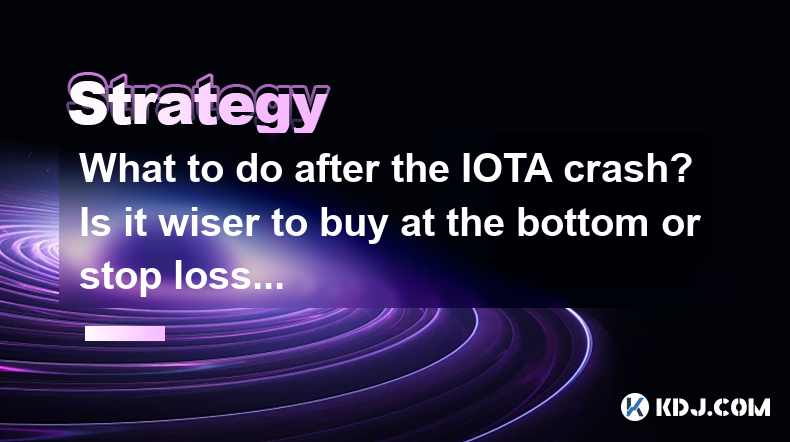
What to do after the IOTA crash? Is it wiser to buy at the bottom or stop loss?
May 01,2025 at 08:43am
After experiencing a significant crash in the value of IOTA, investors and traders are often left wondering about the best course of action. The decision to buy at the bottom or implement a stop loss can be pivotal, and understanding the nuances of each strategy is essential for making informed decisions. This article delves into the various approaches ...

Is the IOTA trading robot easy to use? How to set up an automated strategy?
Apr 30,2025 at 09:21pm
Is the IOTA trading robot easy to use? How to set up an automated strategy? The world of cryptocurrency trading has seen significant advancements in automation, and one such tool is the IOTA trading robot. Many traders are curious about the ease of use of these robots and how to set up an automated strategy. This article will delve into these topics, pr...
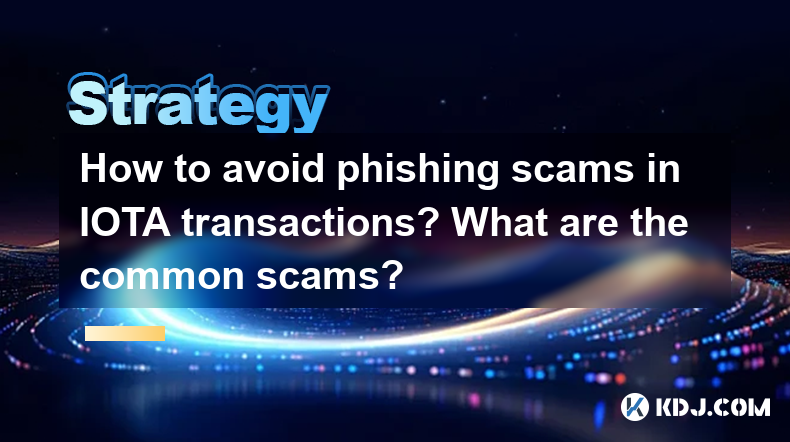
How to avoid phishing scams in IOTA transactions? What are the common scams?
May 04,2025 at 12:14am
Phishing scams are a prevalent issue within the cryptocurrency community, and IOTA transactions are no exception. To safeguard your assets and personal information, it's crucial to understand how to avoid these scams and recognize the common types you might encounter. This article will delve into the strategies for protecting yourself and the typical sc...
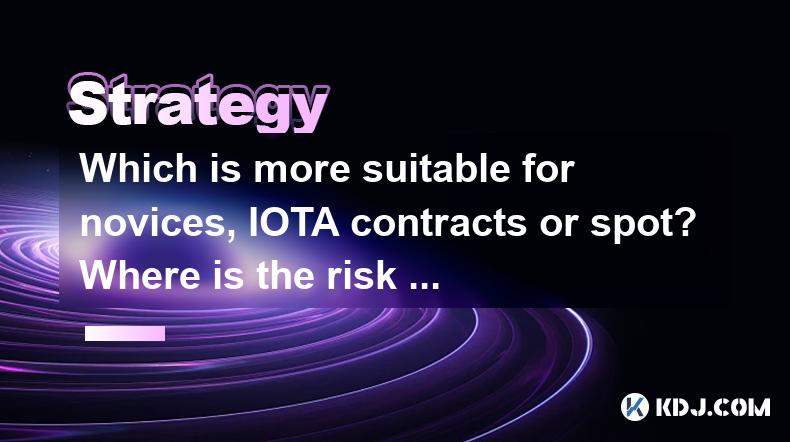
Which is more suitable for novices, IOTA contracts or spot? Where is the risk difference?
May 03,2025 at 03:35pm
When considering which cryptocurrency investment is more suitable for novices, it's essential to understand the differences between IOTA contracts and spot trading. Both options present unique opportunities and risks, but they cater to different types of investors with varying levels of experience and risk tolerance. In this article, we will delve into ...
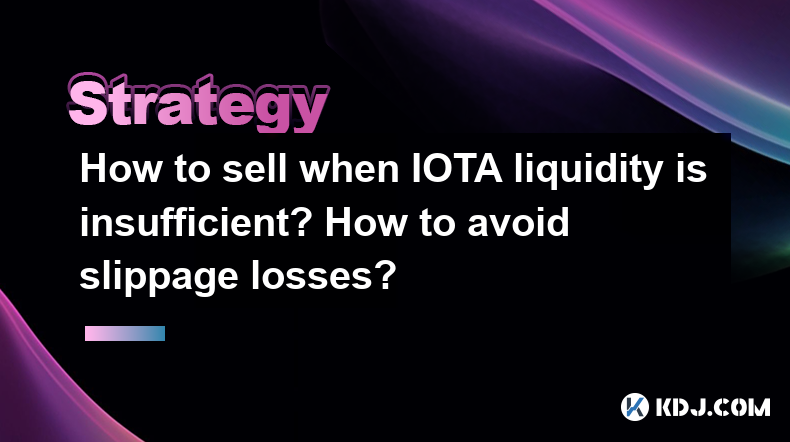
How to sell when IOTA liquidity is insufficient? How to avoid slippage losses?
Apr 30,2025 at 05:21pm
Understanding IOTA LiquidityWhen dealing with cryptocurrencies like IOTA, liquidity refers to how easily you can buy or sell the asset without affecting its market price significantly. Insufficient liquidity in IOTA can lead to challenges such as slippage, where the price at which your order is executed differs from the price you expected. This article ...

Is IOTA a long-term holding or a swing trade? Which one will yield higher returns?
May 04,2025 at 01:56am
Is IOTA a long-term holding or a swing trade? Which one will yield higher returns? IOTA is a unique cryptocurrency that operates on a distributed ledger technology called the Tangle, which is different from the traditional blockchain used by most cryptocurrencies. This distinction has led to a lot of debate about whether IOTA is better suited as a long-...

What to do after the IOTA crash? Is it wiser to buy at the bottom or stop loss?
May 01,2025 at 08:43am
After experiencing a significant crash in the value of IOTA, investors and traders are often left wondering about the best course of action. The decision to buy at the bottom or implement a stop loss can be pivotal, and understanding the nuances of each strategy is essential for making informed decisions. This article delves into the various approaches ...

Is the IOTA trading robot easy to use? How to set up an automated strategy?
Apr 30,2025 at 09:21pm
Is the IOTA trading robot easy to use? How to set up an automated strategy? The world of cryptocurrency trading has seen significant advancements in automation, and one such tool is the IOTA trading robot. Many traders are curious about the ease of use of these robots and how to set up an automated strategy. This article will delve into these topics, pr...

How to avoid phishing scams in IOTA transactions? What are the common scams?
May 04,2025 at 12:14am
Phishing scams are a prevalent issue within the cryptocurrency community, and IOTA transactions are no exception. To safeguard your assets and personal information, it's crucial to understand how to avoid these scams and recognize the common types you might encounter. This article will delve into the strategies for protecting yourself and the typical sc...

Which is more suitable for novices, IOTA contracts or spot? Where is the risk difference?
May 03,2025 at 03:35pm
When considering which cryptocurrency investment is more suitable for novices, it's essential to understand the differences between IOTA contracts and spot trading. Both options present unique opportunities and risks, but they cater to different types of investors with varying levels of experience and risk tolerance. In this article, we will delve into ...

How to sell when IOTA liquidity is insufficient? How to avoid slippage losses?
Apr 30,2025 at 05:21pm
Understanding IOTA LiquidityWhen dealing with cryptocurrencies like IOTA, liquidity refers to how easily you can buy or sell the asset without affecting its market price significantly. Insufficient liquidity in IOTA can lead to challenges such as slippage, where the price at which your order is executed differs from the price you expected. This article ...
See all articles




















































































